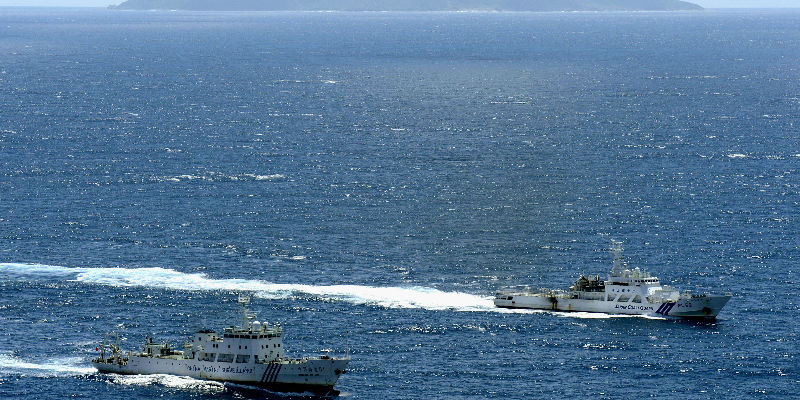US seeks calm over Asian disputes; won’t mediate

The Chinese surveillance ship Haijian No. 51, left, sails near a Japan Coast Guard vessel near disputed islands called Senkaku in Japan and Diaoyu in China, seen in background, in the East China Sea, Friday afternoon, Sept. 14, 2012. Chinese and Japanese government ships exchanged warnings Friday in waters near disputed islands in the East China Sea, while Tokyo called on Beijing to protect its citizens amid anti-Japan protests and reported assaults in China. (AP Photo/Kyodo News)
NEW YORK — The Obama administration on Friday pressed U.S. allies Japan and South Korea to continue their cooperation on North Korea and other key issues despite a dispute over a contested islet. The administration also urged Tokyo and Beijing to make serious diplomatic efforts on an even sharper dispute over maritime borders.
Meeting with the Japanese and South Korean foreign ministers, Secretary of State Hillary Rodham Clinton said “every nation in the region has a responsibility to work to resolve disputes, peacefully lower tensions, promote regional security and stability.” She noted the three key countries’ cooperation is vital to convincing North Korea to give up its nuclear weapons, doing her best to calm their disagreement over the tiny islands known as Dokdo in South Korea and Takeshima in Japan.
The two countries, which both host tens of thousands of American troops, also have been at odds over the historical legacy of Japan’s 35-year occupation of South Korea in the early 20th century and its use of Korean women as sex slaves by soldiers. In June, the two countries put on hold an intelligence-sharing pact after it provoked an outcry in South Korea.
“Our alliances with Japan and South Korea are the cornerstones of peace and prosperity in the region,” Clinton said at the start of the talks with Japanese Foreign Minister Koichiro Gemba and South Korean Foreign Minister Kim Sung-hwan. “Each of these countries represents an enormous success story about what can happen when nations are focused on peace and stability and giving more opportunities to their own people and developing good relationships with their neighbors. We will maintain close cooperation between the three of us. That is a top priority for the United States.”
The dispute between Japan and South Korea is just one of several in Asia, where competing maritime issues are inflaming public sentiment and even provoking violent protests in China. Beijing’s battles range from the resource-rich South China Sea to rock outcroppings administered by Japan.
Article continues after this advertisementChina and Japan traded angry accusations over the islands in a late-night exchange at the U.N. General Assembly on Thursday.
Article continues after this advertisementThat prompted the top U.S. diplomat for East Asia, Kurt Campbell, on Friday to remind the two countries, which have the world’s second- and third-largest economies, to recognize the importance of their relationship and resolve their grievances through dialogue. He said each government should set aside the territorial dispute from its other bilateral issues, acknowledging that it would be “extraordinarily difficult” to solve.
The U.S., however, will not play a mediating role in the dispute, Campbell told a news conference.
In her meeting, Clinton told the Japanese and the Koreans the same thing about mediation, a senior U.S. official said, speaking on condition of anonymity because she wasn’t authorized to speak publicly about the private meeting.
At the General Assembly Friday, South Korea made a thinly veiled reference to Japan’s wartime record. After decrying sexual violence against women, Kim said “heartfelt soul-searching on past wrongdoings” is required for peace and stability between nations.
“A country’s true valor is proven when it confronts the dark side of its past,” the foreign minister said. He didn’t refer to Japan by name, but his comments follow South Korean complaints that Japan has failed to show true contrition or educate its people over Japanese soldiers’ use of Korean sex slaves during World War II.
___
Associated Press writer Matthew Pennington at the United Nations contributed to this report